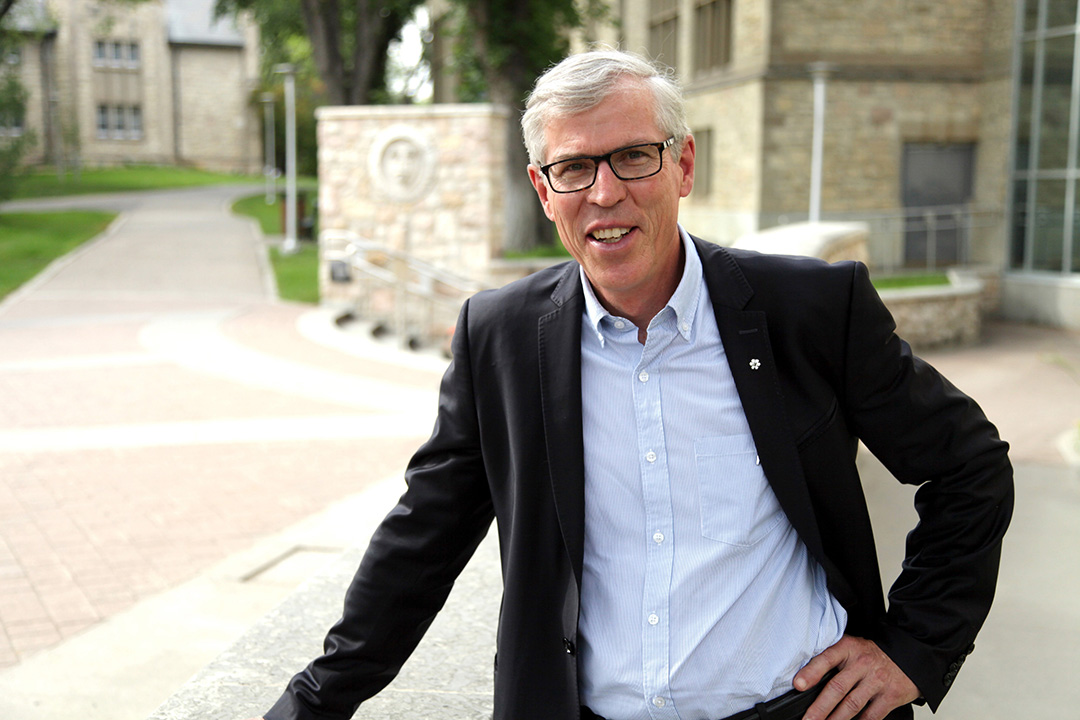
Bill Waiser: Saskatchewan’s historian
Dr. Bill Waiser (DLitt) has devoted his life and career to telling people’s stories.
By Katie Brickman-YoungThe University of Saskatchewan (USask) distinguished professor emeritus in the Department of History is a specialist in western and northern Canadian history, specifically Saskatchewan history.
For Waiser, people and their stories have always been at the forefront of his interest in how the province was shaped and why he went into history as a career.
“Everyone has a story. I like research and uncovering new things,” he said. “History is about looking for stories inside the bigger story. I try and write history that way.”
Waiser was born in Toronto, but visited his paternal grandparents’ homestead in Manitoba every summer. He went to Trent University in Peterborough, Ont., where he studied with prominent Manitoba historian W.L. Morton, before coming to USask as a graduate student in western history. From there, he went on to have a distinguished and decorated career in his field.
“I was always intrigued by western history, partly because of my family’s past,” Waiser said. “I was looking for a school to study prairie history and Saskatchewan seemed the best.”
Waiser began his teaching career in 1980 at USask, instructing large introductory survey classes as well as small graduate seminars. Since then, more than 3,000 USask students have taken a course with Waiser and 41 graduate students completed their theses under his supervision. The impact is not lost on him.
“It is very gratifying to see where they all are and what they are doing with their history degrees,” said Waiser, who retired from full-time teaching in 2014. “I hope I was able to teach them how to read critically, think critically, and both speak and write critically.”
Throughout his career, Waiser has published 18 books on Canadian history, with a focus on Saskatchewan and Indigenous-Non-Indigenous relations. It was through his writing that he earned some of the highest awards and honours.
In 2017, Waiser was named a member of the Order of Canada, the country’s highest civilian honour. This recognition complemented his appointment to the Saskatchewan Order of Merit in 2006 and his election as a Fellow of the Royal Society of Canada (RSC) in 2007.
“Winning the Order of Canada confirmed the work that I’ve been doing has been important work,” he said.
In 2018, Waiser earned the RSC’s J.B. Tyrell medal for outstanding work in Canadian history and the Governor General’s History Award for Popular Media (The Pierre Berton Award), as well as the Governor General Literary Award for Non-Fiction in 2016 for his book, A World We Have Lost.
“That was probably the hardest book I’ve ever done,” he said. “I learned a lot about my own understanding of Saskatchewan history and it was wonderful news when I won.”
Over the course of the past three decades, much of Waiser’s work has been focused on Indigenous-Non-Indigenous history in Saskatchewan.
“I don’t think you can do the work on Canadian history without talking about Indigenous-Non-Indigenous relations—it is essential to the story,” Waiser said.
Waiser’s research was used in the exoneration of Chief Poundmaker, more than 130 years after the Plains Cree chief’s conviction for treason-felony.
Waiser hopes that 2020 will bring further strides towards reconciliation in Saskatchewan and Canada.
“Reconciliation is a shared journey and we need to go down that road together,” said Waiser. “It will be an uncomfortable journey and it isn’t simply moving forward together … We will have to recognize some hard truths about what happened and that will be difficult, but necessary.”

